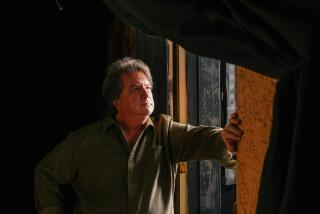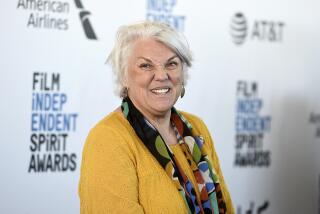Jonathan Demme makes time for ‘Family Week’
If the dysfunctional, self-medicating characters that populate so much 20th-century drama were to check into rehab or get therapy, would they still be stage-worthy? Eugene O’Neill didn’t write “Long Day’s Journey Into Recovery” or Tennessee Williams “A Streetcar Named Wellness.”
But professional help seems the only recourse for Claire, the mother grieving for a dead child in Beth Henley’s “Family Week,” opening Tuesday at off-Broadway’s Lucille Lortel Theatre.
The play is set at an isolated recovery center called Pastures, and in Henley fashion it is a comedy about grief, addiction, domestic violence and the specter of suicide.
“I just thought, ‘what if a terrible thing happens in a family that’s already had terrible things to deal with?’ ” Henley says during a break in rehearsal. “‘How annihilated can you be and still crawl on the earth and want to survive?”
Director Jonathan Demme, sitting across the table in the rehearsal room, lets out a guffaw. “Wow, I can’t wait to see that!” he says with good-natured sarcasm.
But it’s this unique sensibility that has lured Demme, an Oscar-winning filmmaker who has directed horror, drama, comedy, concert films and documentaries, to add theater to his eclectic résumé with a play by the Pulitzer Prize-winning author of “Crimes of the Heart.”
His and Henley’s paths first crossed 20-odd years ago on a PBS pilot starring David Byrne, and later with a script about Canadian bank robbers called “The Stopwatch Gang” that was never given a green light.
Both seem surprised yet gratified that their first collaboration is on the stage.
“Near the end of the very first day of rehearsal, I said, ‘Wait a minute — is this what y’all do every day?’ ” Demme recalls, to general laughter in the rehearsal room. “ ‘You gather and rehearse scenes and then talk about it, and then you go home? I like this job a lot.’ Yeah, the clock’s ticking, because you have to get everything ready to present the show, but as the end of the day approaches, it’s not like, ‘Oh God, we haven’t finished the shots yet, we’re going to have to come back tomorrow.’ It’s like, ‘Wow, I wish we didn’t have to stop!’ ”
“Family Week” premiered in 2000, in a short, poorly received off-Broadway run that starred Carol Kane. But Demme remains committed to the script, which Henley says has been “considerably rewritten” for the new MCC Theatre production. One key difference, she says, has to do with her own identification with Claire — now played by RoseMarie DeWitt of “Mad Men” and “Rachel Getting Married” — who’s lost her teenage son to a senseless shooting.
“My own son Patrick was really young when I wrote this,” Henley confesses, her voice lowering to a slight quaver. At 57, she still has a girlish crinkle in her smile and her speech bears traces of her Mississippi origins. “I actually had huge, huge problems writing it, and it was probably not a good thing to do at the time — but it was an obsession. It wasn’t a choice.”
Now that her son is 14, Henley says, “I’m more compassionate about these people than ever, and I’m able to write things in this version that were too hard for me to write the first time around.”
The ability to say difficult things aloud is a persistent theme, even a running gag, in “Family Week.” At Pastures Recovery Center, the well-meaning but officious counselor, Sandra, guides Claire and her reluctant mother, sister and daughter to write down and speak their feelings plainly to each other. As Sandra explains: “The format for List Work is rigid. ‘When you (behavior), I feel (feeling).”
But as much mileage as Henley gets out of the absurdities of therap-ese, she didn’t set out to lampoon the self-help industry.
“On the contrary,” Henley says. “It’s not enough consolation, because we’re so complicated, but it’s the best we can come up with. I mean, what else do we have for people who have gone through major tragedy?”
The way Demme sees it, “The play manages to draw tremendous comedic resonance from the therapist’s efforts to help. When the List Work is first described to the family, it’s funny. But it turns around. When you get to the List Work …” Demme, who comes off as simultaneously passionate and laidback, jovial and edgy, exhales like a siren: “Whoooo! It’s like the gunfight at the OK Corral. It’s so intense. It’s not funny anymore; it’s deep.”
Surprising emotional turns have been staples of Demme’s work, from “Melvin and Howard” to the harrowing “Silence of the Lambs,” from the funky, picaresque “Something Wild” to the improvisatory “Rachel Getting Married.” It was “Rachel’s” casting director, Bernard Telsey, who wooed Demme to the stage; in addition to casting Broadway shows and films, Telsey co-runs the off-Broadway company MCC Theatre.
“Though he’s never directed a play, he’s directed — it’s the same thing but with different terminology, different job titles,” Telsey says. “But the way he’s collaborated, it’s as if he’s done this 20 times. He’s used the rehearsal process a lot like the editing.”
It really hasn’t been much of an adjustment, Demme insists. “It’s more the same than it is different. When we make movies, there’s a moment when it’s theater — the camera’s rolling, but it’s happening, and you’re actually there when they’re doing it! This job is always about story, characters, writing and actors. I love filmmaking and editing and all that stuff, but this is the essence of what I love the most about filmmaking.”
Henley says “Jonathan’s kind of magic is that even though he’s leading us, we don’t really feel it. It just feels intuitive and organic and safe.” She pauses, then adds: “Maybe that is therapy.”
More to Read
The biggest entertainment stories
Get our big stories about Hollywood, film, television, music, arts, culture and more right in your inbox as soon as they publish.
You may occasionally receive promotional content from the Los Angeles Times.






